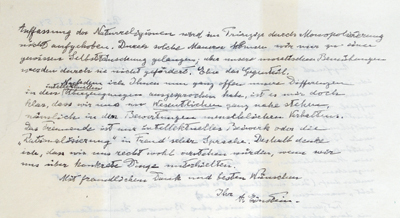in the Details
the Einstein-Gutkind letter
discussed here February 7.
The pictures are from
the Bloomsbury Auctions site.
The Bloomsbury Auctions caption for these images is as follows:
303. Einstein (Albert, theoretical physicist, 1879-1955) Autograph Letter signed to Eric B. Gutkind, in German, 1½pp. & envelope, 4to, Princeton, 3rd January 1954, thanking him for a copy of his book and expressing his view of God and Judaism, [The word God is for me nothing more than the expression and product of human weaknesses, the Bible a collection of honorable, but still primitive legends which are nevertheless pretty childish… . For me the Jewish religion like all other religions is an incarnation of the most childish superstitions. And the Jewish people to whom I gladly belong and with whose mentality I have a deep affinity have no different quality for me than all other people…], folds, slightly browned ; and a photograph of Gutkind, v.s., v.d.
est. £6000 – £8000
Einstein’s view of God and Judaism.
Eric B. Gutkind (1877-1965), philosopher; author of Choose Life: The Biblical Call to Revolt, 1952.
Albert Einstein – see also lot 497Sold for £170000
Sale 649, 15th May 2008
Here is a close reading of the part of the letter itself that Bloomsbury gives in English, transcribed from the above images.
Line-by-line transcription of paragraph 2, starting at line 4 of that paragraph:
... Das Wort Gott ist für mich nichts als Ausdruck und Produkt menschlicher Schwächen, die Bibel eine Sammlung ehrwürdiger, aber doch reichlich primitiver Legenden. Keine noch so feinsinnige Auslegung kann (für mich) etwas daran ändern. Diese verfeinerten Auslegungen sind naturgemäß höchst mannigfaltig und haben so gut wie nichts mit dem Urtext zu schaffen. Für mich ist die unverfälschte jüdische Religion, wie alle anderen Religionen, eine Inkarnation des primitiven Aberglaubens. Und das jüdische Volk, zu dem ich gern gehöre und mit dessen Mentalität ich tief verwachsen bin, hat für mich doch keine andersartige Qualität als alle anderen Völker. So weit meine Erfahrung reicht, ist es auch um nichts besser als andere menschliche Gruppierungen, wenn es auch durch Mangel an Macht gegen die schlimmsten Auswüchse gesichert ist. Ansonsten kann ich nichts "Auserwähltes" an ihm wahrnehmen.The Guardian of May 13, 2008 stated that the following was "translated from German by Joan Stambaugh"–
... The word God is for me nothing more than the expression and product of human weaknesses, the Bible a collection of honourable, but still primitive legends which are nevertheless pretty childish. No interpretation no matter how subtle can (for me) change this. These subtilised interpretations are highly manifold according to their nature and have almost nothing to do with the original text. For me the Jewish religion like all other religions is an incarnation of the most childish [German: primitiven] superstitions. And the Jewish people to whom I gladly belong and with whose mentality I have a deep affinity have no different quality for me than all other people. As far as my experience goes, they are also no better than other human groups, although they are protected from the worst cancers by a lack of power. Otherwise I cannot see anything 'chosen' about them.
Phrases by Stambaugh that do not appear in the German text are highlighted.
Stambaugh, a philosophy professor, is the author of a work on Buddhism, The Formless Self. For some related material on young men who "go crying 'The world is myself, life is myself'" in May, see Wallace Stevens's "The Pediment of Appearance."

